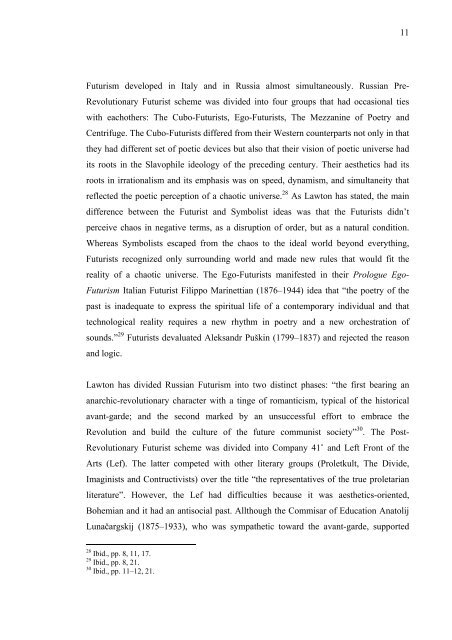Boris Asaf'ev and the Soviet Musicology - E-thesis
Boris Asaf'ev and the Soviet Musicology - E-thesis
Boris Asaf'ev and the Soviet Musicology - E-thesis
You also want an ePaper? Increase the reach of your titles
YUMPU automatically turns print PDFs into web optimized ePapers that Google loves.
Futurism developed in Italy <strong>and</strong> in Russia almost simultaneously. Russian Pre-<br />
Revolutionary Futurist scheme was divided into four groups that had occasional ties<br />
with eacho<strong>the</strong>rs: The Cubo-Futurists, Ego-Futurists, The Mezzanine of Poetry <strong>and</strong><br />
Centrifuge. The Cubo-Futurists differed from <strong>the</strong>ir Western counterparts not only in that<br />
<strong>the</strong>y had different set of poetic devices but also that <strong>the</strong>ir vision of poetic universe had<br />
its roots in <strong>the</strong> Slavophile ideology of <strong>the</strong> preceding century. Their aes<strong>the</strong>tics had its<br />
roots in irrationalism <strong>and</strong> its emphasis was on speed, dynamism, <strong>and</strong> simultaneity that<br />
reflected <strong>the</strong> poetic perception of a chaotic universe. 28 As Lawton has stated, <strong>the</strong> main<br />
difference between <strong>the</strong> Futurist <strong>and</strong> Symbolist ideas was that <strong>the</strong> Futurists didn’t<br />
perceive chaos in negative terms, as a disruption of order, but as a natural condition.<br />
Whereas Symbolists escaped from <strong>the</strong> chaos to <strong>the</strong> ideal world beyond everything,<br />
Futurists recognized only surrounding world <strong>and</strong> made new rules that would fit <strong>the</strong><br />
reality of a chaotic universe. The Ego-Futurists manifested in <strong>the</strong>ir Prologue Ego-<br />
Futurism Italian Futurist Filippo Marinettian (1876–1944) idea that “<strong>the</strong> poetry of <strong>the</strong><br />
past is inadequate to express <strong>the</strong> spiritual life of a contemporary individual <strong>and</strong> that<br />
technological reality requires a new rhythm in poetry <strong>and</strong> a new orchestration of<br />
sounds.” 29 Futurists devaluated Aleks<strong>and</strong>r Puškin (1799–1837) <strong>and</strong> rejected <strong>the</strong> reason<br />
<strong>and</strong> logic.<br />
Lawton has divided Russian Futurism into two distinct phases: “<strong>the</strong> first bearing an<br />
anarchic-revolutionary character with a tinge of romanticism, typical of <strong>the</strong> historical<br />
avant-garde; <strong>and</strong> <strong>the</strong> second marked by an unsuccessful effort to embrace <strong>the</strong><br />
Revolution <strong>and</strong> build <strong>the</strong> culture of <strong>the</strong> future communist society” 30 . The Post-<br />
Revolutionary Futurist scheme was divided into Company 41˚ <strong>and</strong> Left Front of <strong>the</strong><br />
Arts (Lef). The latter competed with o<strong>the</strong>r literary groups (Proletkult, The Divide,<br />
Imaginists <strong>and</strong> Contructivists) over <strong>the</strong> title “<strong>the</strong> representatives of <strong>the</strong> true proletarian<br />
literature”. However, <strong>the</strong> Lef had difficulties because it was aes<strong>the</strong>tics-oriented,<br />
Bohemian <strong>and</strong> it had an antisocial past. Allthough <strong>the</strong> Commisar of Education Anatolij<br />
Lunačargskij (1875–1933), who was sympa<strong>the</strong>tic toward <strong>the</strong> avant-garde, supported<br />
28 Ibid., pp. 8, 11, 17.<br />
29 Ibid., pp. 8, 21.<br />
30 Ibid., pp. 11–12, 21.<br />
11

















